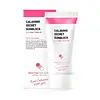What's inside
What's inside
 Key Ingredients
Key Ingredients

 Benefits
Benefits

 Concerns
Concerns

 Ingredients Side-by-side
Ingredients Side-by-side

Hydrolyzed Collagen
EmollientDibutyl Adipate
EmollientWater
Skin ConditioningPropanediol
SolventIsoamyl P-Methoxycinnamate
UV AbsorberDiethylamino Hydroxybenzoyl Hexyl Benzoate
UV FilterBis-Ethylhexyloxyphenol Methoxyphenyl Triazine
Skin ConditioningTerephthalylidene Dicamphor Sulfonic Acid
UV AbsorberC12-15 Alkyl Benzoate
AntimicrobialNiacinamide
SmoothingPropylene Glycol Dicaprylate
EmollientTromethamine
BufferingPolyglyceryl-6 Stearate
EmollientCetearyl Alcohol
EmollientHydroxyethyl Acrylate/Sodium Acryloyldimethyl Taurate Copolymer
Emulsion StabilisingPotassium Cetyl Phosphate
EmulsifyingHydrogenated Palm Glycerides
EmollientDipropylene Glycol
HumectantHydroxyacetophenone
AntioxidantPolyglyceryl-6 Behenate
Emulsion StabilisingCaprylyl Glycol
EmollientSphingomonas Ferment Extract
Skin ConditioningAdenosine
Skin ConditioningSorbitan Isostearate
EmulsifyingHydrolyzed Hyaluronic Acid
HumectantHyaluronic Acid
HumectantHydrolyzed Sodium Hyaluronate
Skin ConditioningSodium Hyaluronate Crosspolymer
HumectantSodium Hyaluronate
HumectantPotassium Hyaluronate
Skin ConditioningHydroxypropyltrimonium Hyaluronate
Dipotassium Glycyrrhizate
HumectantSodium Acetylated Hyaluronate
HumectantHydrolyzed Glycosaminoglycans
Humectant1,2-Hexanediol
Skin ConditioningGlycerin
HumectantGlutathione
Biotin
AntiseborrhoeicAscorbyl Glucoside
AntioxidantBenzyl Glycol
SolventBeta-Carotene
Skin ConditioningSoluble Collagen
HumectantCollagen Extract
Skin ConditioningEthylhexylglycerin
Skin ConditioningAcetyl Hexapeptide-8
HumectantCopper Tripeptide-1
Skin ConditioningPalmitoyl Pentapeptide-4
Skin ConditioningOligopeptide-1
Skin ConditioningHydrolyzed Collagen, Dibutyl Adipate, Water, Propanediol, Isoamyl P-Methoxycinnamate, Diethylamino Hydroxybenzoyl Hexyl Benzoate, Bis-Ethylhexyloxyphenol Methoxyphenyl Triazine, Terephthalylidene Dicamphor Sulfonic Acid, C12-15 Alkyl Benzoate, Niacinamide, Propylene Glycol Dicaprylate, Tromethamine, Polyglyceryl-6 Stearate, Cetearyl Alcohol, Hydroxyethyl Acrylate/Sodium Acryloyldimethyl Taurate Copolymer, Potassium Cetyl Phosphate, Hydrogenated Palm Glycerides, Dipropylene Glycol, Hydroxyacetophenone, Polyglyceryl-6 Behenate, Caprylyl Glycol, Sphingomonas Ferment Extract, Adenosine, Sorbitan Isostearate, Hydrolyzed Hyaluronic Acid, Hyaluronic Acid, Hydrolyzed Sodium Hyaluronate, Sodium Hyaluronate Crosspolymer, Sodium Hyaluronate, Potassium Hyaluronate, Hydroxypropyltrimonium Hyaluronate, Dipotassium Glycyrrhizate, Sodium Acetylated Hyaluronate, Hydrolyzed Glycosaminoglycans, 1,2-Hexanediol, Glycerin, Glutathione, Biotin, Ascorbyl Glucoside, Benzyl Glycol, Beta-Carotene, Soluble Collagen, Collagen Extract, Ethylhexylglycerin, Acetyl Hexapeptide-8, Copper Tripeptide-1, Palmitoyl Pentapeptide-4, Oligopeptide-1
Water
Skin ConditioningZinc Oxide
Cosmetic ColorantButyloctyl Salicylate
Skin ConditioningCyclopentasiloxane
EmollientCetyl Ethylhexanoate
EmollientCyclohexasiloxane
EmollientButylene Glycol
HumectantCetyl PEG/PPG-10/1 Dimethicone
EmulsifyingDimethicone
EmollientNiacinamide
SmoothingIsononyl Isononanoate
EmollientCalamine
AbsorbentPEG-10 Dimethicone
Skin ConditioningDimethicone/PEG-10/15 Crosspolymer
Magnesium Sulfate
Disteardimonium Hectorite
StabilisingCI 77891
Cosmetic ColorantDimethicone Crosspolymer
Emulsion StabilisingEthyl Hexanediol
SolventPanthenol
Skin ConditioningPEG-30 Dipolyhydroxystearate
EmulsifyingTriethoxycaprylylsilane
Ceresin
Emulsion StabilisingSilica Dimethyl Silylate
EmollientParfum
MaskingStearic Acid
CleansingGlyceryl Caprylate
EmollientSilica
AbrasiveLauroyl Lysine
Skin ConditioningDisodium EDTA
Adenosine
Skin ConditioningCI 77491
Cosmetic ColorantTotarol
AntioxidantAloe Barbadensis Leaf Extract
EmollientCentella Asiatica Extract
CleansingCaprylyl Glycol
EmollientWater, Zinc Oxide, Butyloctyl Salicylate, Cyclopentasiloxane, Cetyl Ethylhexanoate, Cyclohexasiloxane, Butylene Glycol, Cetyl PEG/PPG-10/1 Dimethicone, Dimethicone, Niacinamide, Isononyl Isononanoate, Calamine, PEG-10 Dimethicone, Dimethicone/PEG-10/15 Crosspolymer, Magnesium Sulfate, Disteardimonium Hectorite, CI 77891, Dimethicone Crosspolymer, Ethyl Hexanediol, Panthenol, PEG-30 Dipolyhydroxystearate, Triethoxycaprylylsilane, Ceresin, Silica Dimethyl Silylate, Parfum, Stearic Acid, Glyceryl Caprylate, Silica, Lauroyl Lysine, Disodium EDTA, Adenosine, CI 77491, Totarol, Aloe Barbadensis Leaf Extract, Centella Asiatica Extract, Caprylyl Glycol
Ingredients Explained
These ingredients are found in both products.
Ingredients higher up in an ingredient list are typically present in a larger amount.
Adenosine is in every living organism. It is one of four components in nucleic acids that helps store our DNA.
Adenosine has many benefits when used. These benefits include hydrating the skin, smoothing skin, and reducing wrinkles. Once applied, adenosine increases collagen production. It also helps with improving firmness and tissue repair.
Studies have found adenosine may also help with wound healing.
In skincare products, Adenosine is usually derived from yeast.
Learn more about AdenosineCaprylyl Glycol is a humectant and emollient, meaning it attracts and preserves moisture.
It is a common ingredient in many products, especially those designed to hydrate skin. The primary benefits are retaining moisture, skin softening, and promoting a healthy skin barrier.
Though Caprylyl Glycol is an alcohol derived from fatty acids, it is not the kind that can dry out skin.
This ingredient is also used as a preservative to extend the life of products. It has slight antimicrobial properties.
Learn more about Caprylyl GlycolNiacinamide is a multitasking form of vitamin B3 that strengthens the skin barrier, reduces pores and dark spots, regulates oil, and improves signs of aging.
And the best part? It's gentle and well-tolerated by most skin types, including sensitive and reactive skin.
You might have heard of "niacin flush", or the reddening of skin that causes itchiness. Niacinamide has not been found to cause this.
In very rare cases, some individuals may not be able to tolerate niacinamide at all or experience an allergic reaction to it.
If you are experiencing flaking, irritation, and dryness with this ingredient, be sure to double check all your products as this ingredient can be found in all categories of skincare.
When incorporating niacinamide into your routine, look out for concentration amounts. Typically, 5% niacinamide provides benefits such as fading dark spots. However, if you have sensitive skin, it is better to begin with a smaller concentration.
When you apply niacinamide to your skin, your body converts it into nicotinamide adenine dinucleotide (NAD). NAD is an essential coenzyme that is already found in your cells as "fuel" and powers countless biological processes.
In your skin, NAD helps repair cell damage, produce new healthy cells, support collagen production, strengthen the skin barrier, and fight environmental stressors (like UV and pollution).
Our natural NAD levels start to decline with age, leading to slower skin repair, visible aging, and a weaker skin barrier. By providing your skin niacinamide, you're recharging your skin's NAD levels. This leads to stronger, healthier, and younger looking skin.
Another name for vitamin B3 is nicotinamide. This vitamin is water-soluble and our bodies don't store it. We obtain Vitamin B3 from either food or skincare. Meat, fish, wheat, yeast, and leafy greens contain vitamin B3.
The type of niacinamide used in skincare is synthetically created.
Learn more about NiacinamideWater. It's the most common cosmetic ingredient of all. You'll usually see it at the top of ingredient lists, meaning that it makes up the largest part of the product.
So why is it so popular? Water most often acts as a solvent - this means that it helps dissolve other ingredients into the formulation.
You'll also recognize water as that liquid we all need to stay alive. If you see this, drink a glass of water. Stay hydrated!
Learn more about Water